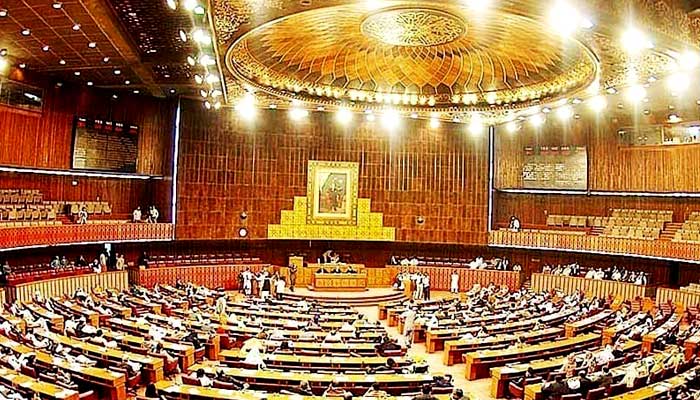Senate chairman supports open-ballot elections in response to SC
The person who goes against the party policy should face consequences, says Sadiq Sanjrani
Chairman Senate Sadiq Sanjrani has supported the idea of conducting Senate elections through open-ballot, as he responded to a presidential reference filed by the Centre in the Supreme Court.
In his five-page response to the SC filed through his lawyer Tariq Aziz, Sanjrani said allegations of floor-crossing (changing party loyalties) and rigging were levelled following the 2015 Senate elections after which there was a debate over the polling procedure.
Sanjrani said that it was suggested in the Senate's House Committee that the name of the voter should be written on the back of the ballot paper and in case of a doubt, the party chief should have the power to see the details.
The Senate chairman said that transparent elections were in the larger interest of the nation. He maintained that the Constitution was silent regarding Senate elections, while interpretation of the Constitution was the job of the Supreme Court.
Sanjrani said that all stakeholders agree that the Senate elections should be transparent, and the person who goes against the party policy should face consequences.
Khyber Pakhtunkhwa, Punjab, and Balochistan government's have also backed the federal government's opinion of holding open-ballot polls, while Sindh has rejected the idea.
Govt to abide by court verdict on Senate poll
Earlier today, Prime Minister Imran Khan, while emphasising transparency in Senate election, said that the government would abide by the court verdict on the matter.
The prime minister, in a meeting with Senator Sajjad Turi, said the history bears witness to horse trading in Senate elections and the government desires to hold fair elections for the Upper House of parliament.
Special Assistant to PM on Political Affairs Amir Dogar also attended the meeting which discussed the strategy for the upcoming Senate elections.
Senator Sajjad Turi apprised the prime minister of the positive and effective contribution by outgoing senators towards legislation.
'Open ballot elections will require constitutional amendment'
On January 16, in its written response to the SC in the presidential reference seeking an opinion on Senate elections, the Election Commission of Pakistan stated that in order to switch from secret balloting to an open ballot method, an amendment to the Constitution will be required.
The ECP said that the Senate elections, much like the elections for the prime minister and the president, fall under the Constitution.
"To bring about an end to secret balloting, a constitutional amendment will be required," said the election commission.
The response on behalf of the ECP secretary was filed to the court by Advocate Shahjeel Shehryar Swati and spans 12 pages.
The presidential reference
The reference, filed by the government, says that the president has sought the apex court's opinion on whether the condition of holding a secret ballot referred to in Article 226 of the Constitution is applicable only for the elections held under the Constitution such as the election to the office of president, speakers and deputy speakers of the Parliament and provincial assemblies and "not to other elections such as the election for the members of Senate" held under the Elections Act 2017 enacted to pursuant to Article 222 read with Entry 41 (1) of the Fourth Schedule to the Constitution "which may be held by way of secret or open ballot" as provided for in the Act.
According to the government, the nature of the elections and the way it is conducted has not been clearly mentioned in the Constitution.
The government has said that the election for the Senate is conducted in accordance with the Election Act of 2017 and asked if it is possible to introduce the idea of open-balloting in the Upper House of the Parliament.
-
Security forces gun down 30 terrorists in multiple IBOs in KP: ISPR
-
MQM-P calls for new province in Sindh
-
US report validates Pakistan military edge over India: PM
-
Banned TTP poses serious threat to Pakistan security: UNSC panel
-
CM Afridi clarifies remarks on by-poll after ECP requests army deployment
-
Dubai sees 3.2m Pakistani passengers in 2025 as airport sets new milestone
-
Security forces kill 23 Indian proxy terrorists in KP's Kurram
-
Pakistan to construct island to boost oil exploration: report












